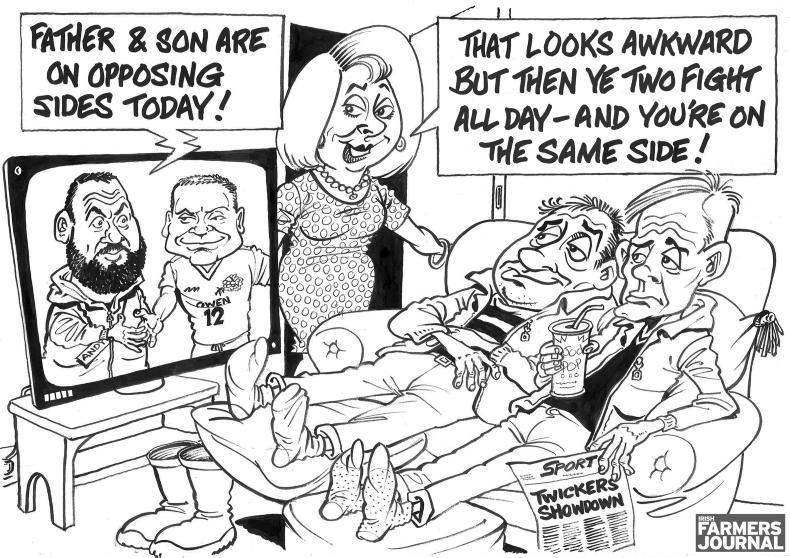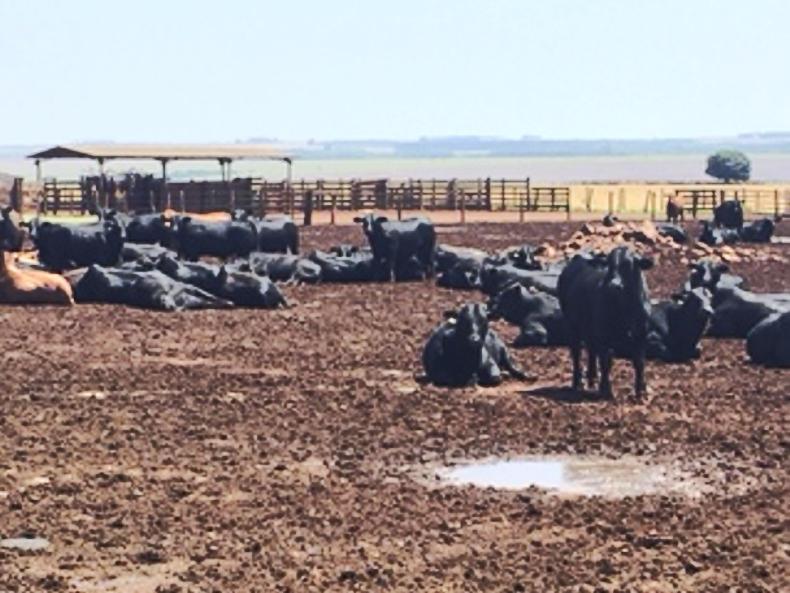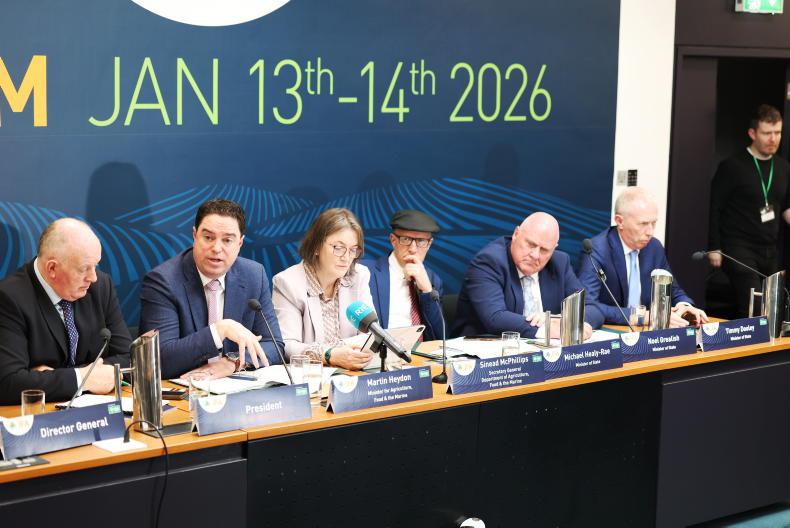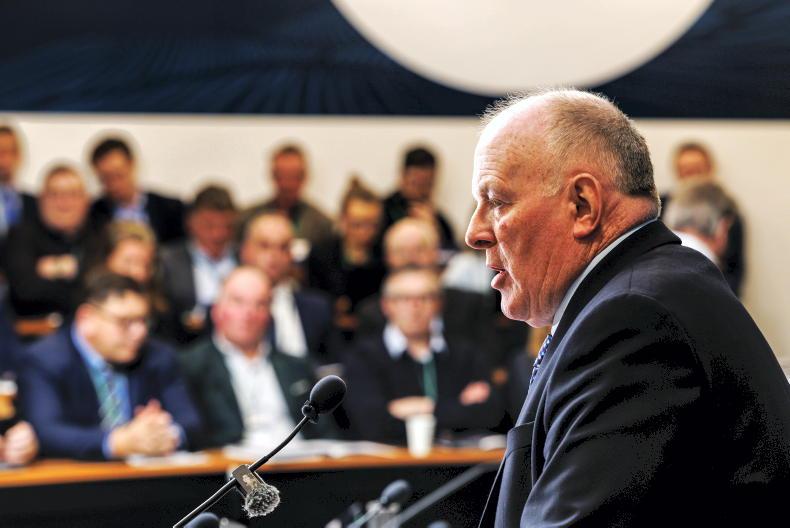As we reported on www.farmersjournal.ie on Saturday, leaked documents obtained by the Irish Farmers Journal detail a new EU proposal to cut the next CAP budget by 14%. This week, Phelim O’Neill looks at the impact on farm payments and highlights the extent to which the financial support for agriculture, as a percentage of total EU spending, has collapsed.
Over the last 40 years, the CAP budget has fallen from 75% of the total EU budget to just 30% under the current proposal.
The proposal will see the average CAP payment in Ireland of €14,400 cut by just over €2,000. It will be tabled by European Council president Charles Michel when EU heads of state convene for a two-day council meeting in Brussels commencing today (Thursday).
The move by the European Council clearly shows the extent to which Brussels has learned little from Brexit. While there were a number of factors at play in shaping the outcome of the UK referendum, the extent to which EU policy – particularly around globalisation of markets – left large swaths of UK society behind had a major influence. It was northern England and Wales that opted for Brexit – both areas where heavy industries such as coal, iron and textiles were wiped out by globalisation.
We should be in no doubt that support for a reduction in the overall CAP budget is in effect supporting a move towards the globalisation of food production. It is a strategy that will of course be denied by politicians and policy-makers – but actions speak louder than words.
A policy agenda that removes €54bn per annum from the income of EU farmers while at the same driving up costs through increased regulation and destructing market value by pursuing a free trade agenda – most recently in the form of Mercosur – will decimate EU food production.
Meanwhile, farmers are continuously being met by a more demanding consumer base that is spending less and less each year on food as a percentage of their total consumption expenditure. It is a scenario that sees farm incomes across most member states now running at less than 50% of salaries in the whole economy.
Leo Varadkar must make it clear to EU leaders that whoever the next Taoiseach may be, Ireland will veto any move to force through a CAP budget that does not adequately safeguard farmer incomes
In this environment, any move to further reduce the CAP budget and cut supports to an already economically vulnerable sector requires very careful consideration – not just from the perspective of food security but also the societal impact and reaction in the regions most affected. Voting patterns in northern England and Wales should serve as a stark warning.
Not only do EU farmers deliver food security for 500m EU citizens, the sector also supports 44m jobs, mostly in rural communities.
Nowhere will the impact of further cuts to the CAP budget be felt more than in rural Ireland, where EU data shows farm incomes to be just 30% of salaries in the whole economy.
Of course, added to the challenges outlined above, our agriculture sector is also facing a Brexit train coming down the tracks. Again, where does a 14% cut in CAP support payments to Irish farmers fit in with repeated commitments from the EU to stand side by side with Irish farmers in the fallout from Brexit?
The political stalemate currently engulfing domestic politics is unfortunate at such a critical time for Irish farmers. But at a time when parties are divided, the need to protect the CAP budget in the interests of Irish farmers is something that all party leaders should unite behind and make known in Brussels.
Leo Varadkar must make it clear to EU leaders that regardless of the makeup of the next Government and whoever the next Taoiseach may be, Ireland will veto any move to force through a CAP budget that does not adequately safeguard farmer incomes.
Given what is at stake, there can be no room for complacency. As Barry Cassidy details, there is €2.1 bn at stake in relation to incomes on Irish farms over the next seven years. The figure rises to over €3bn when measured against IFA demands for an increased budget to reflect inflation. There is simply not the scope to remove this kind of income support from Irish farmers and for the sector to remain functional.
Political parties and farm organisations need to unite behind ensuring CAP is protected and that agriculture is positioned to avail of funding through both the Green Deal and the promised Brexit supports – both of which should be explored as funding options for a possible restructuring of the suckler herd.

\ Jim Cogan
Tillage: potatoes and protein in focus
The challenge of coping with the loss of long-serving potato products like diquat and CIPC was highlighted to potato growers at the National Potato Conference earlier this week.
Growers had been made aware of a very useful replacement for the long-serving CIPC sprout suppressant but there is no equally versatile replacement for diquat to burn down the haulm. The changes prompted a number of speakers to emphasise the need for growers to be more aware of the potential impacts of variety choice, nitrogen rate and planting date in achieving successful haulm destruction and ambient store sprout suppression in future.
This conference was also told of the success of the recent marketing campaign for potatoes and the introduction of a new campaign to specifically target millennial consumers who are the least frequent consumers of potatoes.
At a very interesting IFA seminar in Tipperary, growers emphasised the huge amount of planting still to be done this spring. That meeting heard of the likely scarcity of certified seed this spring to meet this planting requirement and emphasised the benefits of considering protein crops or spring rape as an alternative to barley, which is heavily discounted at the moment in anticipation of high European production due to similar planting difficulties in other countries.
Dairy: Greenfield Farm agreement
The Agricultural Trust and Glanbia have concluded the sale of their shareholdings in Greenfield Dairy Partners Ltd to the Phelan family, in accordance with the terms of the shareholders agreement.
Over the 10-year period, the project generated many key learnings for farmers and the greater industry as Irish dairying prepared for and went through a period of transformational change. We would like to thank all farmers who contributed to the project through their engagement.
We would also like to acknowledge the valuable input from Teagasc and all those who contributed to the day-to-day management of the farm.
The foresight shown by FBD Trust and the Department of Agriculture in helping establish the project must also be acknowledged. We wish the Phelan family all the very best with the business into the future.
Pedigree magazine: tradition of quality breeding to the fore
Included in this week’s edition is a free 32-page Pedigree magazine, in which we look at what could be coming down the line and how it will affect breeding into the future.
The ICBF has had a big influence in rolling out technologies such as genomics and BDGP but sometimes this has led to more questions than answers in pedigree circles. An exclusive six-page interview with ICBF sees Shane Murphy get the answers to questions breeders have been asking.
The magazine also looks at how pedigree systems operate in other parts of the world and we get an insight into three-seed stock producers in Canada.
Agribusiness: what makes Kerry Group different?
At a time when there has been significant destruction in shareholder value in many of our agri-food companies, Kerry PLC continues to go from strength to strength.
With 2019 profits approaching €1bn, a 37% increase in share value over the period seems merited.
So, what makes Kerry different? The strategy of building deep, solution-focused relationships with their customer base is obviously yielding dividends and allows the business extend the conversation beyond one focused solely on price.
See details on Kerry’s financial performance here and an interview with CEO Edmond Scanlon here.
As we reported on www.farmersjournal.ie on Saturday, leaked documents obtained by the Irish Farmers Journal detail a new EU proposal to cut the next CAP budget by 14%. This week, Phelim O’Neill looks at the impact on farm payments and highlights the extent to which the financial support for agriculture, as a percentage of total EU spending, has collapsed.
Over the last 40 years, the CAP budget has fallen from 75% of the total EU budget to just 30% under the current proposal.
The proposal will see the average CAP payment in Ireland of €14,400 cut by just over €2,000. It will be tabled by European Council president Charles Michel when EU heads of state convene for a two-day council meeting in Brussels commencing today (Thursday).
The move by the European Council clearly shows the extent to which Brussels has learned little from Brexit. While there were a number of factors at play in shaping the outcome of the UK referendum, the extent to which EU policy – particularly around globalisation of markets – left large swaths of UK society behind had a major influence. It was northern England and Wales that opted for Brexit – both areas where heavy industries such as coal, iron and textiles were wiped out by globalisation.
We should be in no doubt that support for a reduction in the overall CAP budget is in effect supporting a move towards the globalisation of food production. It is a strategy that will of course be denied by politicians and policy-makers – but actions speak louder than words.
A policy agenda that removes €54bn per annum from the income of EU farmers while at the same driving up costs through increased regulation and destructing market value by pursuing a free trade agenda – most recently in the form of Mercosur – will decimate EU food production.
Meanwhile, farmers are continuously being met by a more demanding consumer base that is spending less and less each year on food as a percentage of their total consumption expenditure. It is a scenario that sees farm incomes across most member states now running at less than 50% of salaries in the whole economy.
Leo Varadkar must make it clear to EU leaders that whoever the next Taoiseach may be, Ireland will veto any move to force through a CAP budget that does not adequately safeguard farmer incomes
In this environment, any move to further reduce the CAP budget and cut supports to an already economically vulnerable sector requires very careful consideration – not just from the perspective of food security but also the societal impact and reaction in the regions most affected. Voting patterns in northern England and Wales should serve as a stark warning.
Not only do EU farmers deliver food security for 500m EU citizens, the sector also supports 44m jobs, mostly in rural communities.
Nowhere will the impact of further cuts to the CAP budget be felt more than in rural Ireland, where EU data shows farm incomes to be just 30% of salaries in the whole economy.
Of course, added to the challenges outlined above, our agriculture sector is also facing a Brexit train coming down the tracks. Again, where does a 14% cut in CAP support payments to Irish farmers fit in with repeated commitments from the EU to stand side by side with Irish farmers in the fallout from Brexit?
The political stalemate currently engulfing domestic politics is unfortunate at such a critical time for Irish farmers. But at a time when parties are divided, the need to protect the CAP budget in the interests of Irish farmers is something that all party leaders should unite behind and make known in Brussels.
Leo Varadkar must make it clear to EU leaders that regardless of the makeup of the next Government and whoever the next Taoiseach may be, Ireland will veto any move to force through a CAP budget that does not adequately safeguard farmer incomes.
Given what is at stake, there can be no room for complacency. As Barry Cassidy details, there is €2.1 bn at stake in relation to incomes on Irish farms over the next seven years. The figure rises to over €3bn when measured against IFA demands for an increased budget to reflect inflation. There is simply not the scope to remove this kind of income support from Irish farmers and for the sector to remain functional.
Political parties and farm organisations need to unite behind ensuring CAP is protected and that agriculture is positioned to avail of funding through both the Green Deal and the promised Brexit supports – both of which should be explored as funding options for a possible restructuring of the suckler herd.

\ Jim Cogan
Tillage: potatoes and protein in focus
The challenge of coping with the loss of long-serving potato products like diquat and CIPC was highlighted to potato growers at the National Potato Conference earlier this week.
Growers had been made aware of a very useful replacement for the long-serving CIPC sprout suppressant but there is no equally versatile replacement for diquat to burn down the haulm. The changes prompted a number of speakers to emphasise the need for growers to be more aware of the potential impacts of variety choice, nitrogen rate and planting date in achieving successful haulm destruction and ambient store sprout suppression in future.
This conference was also told of the success of the recent marketing campaign for potatoes and the introduction of a new campaign to specifically target millennial consumers who are the least frequent consumers of potatoes.
At a very interesting IFA seminar in Tipperary, growers emphasised the huge amount of planting still to be done this spring. That meeting heard of the likely scarcity of certified seed this spring to meet this planting requirement and emphasised the benefits of considering protein crops or spring rape as an alternative to barley, which is heavily discounted at the moment in anticipation of high European production due to similar planting difficulties in other countries.
Dairy: Greenfield Farm agreement
The Agricultural Trust and Glanbia have concluded the sale of their shareholdings in Greenfield Dairy Partners Ltd to the Phelan family, in accordance with the terms of the shareholders agreement.
Over the 10-year period, the project generated many key learnings for farmers and the greater industry as Irish dairying prepared for and went through a period of transformational change. We would like to thank all farmers who contributed to the project through their engagement.
We would also like to acknowledge the valuable input from Teagasc and all those who contributed to the day-to-day management of the farm.
The foresight shown by FBD Trust and the Department of Agriculture in helping establish the project must also be acknowledged. We wish the Phelan family all the very best with the business into the future.
Pedigree magazine: tradition of quality breeding to the fore
Included in this week’s edition is a free 32-page Pedigree magazine, in which we look at what could be coming down the line and how it will affect breeding into the future.
The ICBF has had a big influence in rolling out technologies such as genomics and BDGP but sometimes this has led to more questions than answers in pedigree circles. An exclusive six-page interview with ICBF sees Shane Murphy get the answers to questions breeders have been asking.
The magazine also looks at how pedigree systems operate in other parts of the world and we get an insight into three-seed stock producers in Canada.
Agribusiness: what makes Kerry Group different?
At a time when there has been significant destruction in shareholder value in many of our agri-food companies, Kerry PLC continues to go from strength to strength.
With 2019 profits approaching €1bn, a 37% increase in share value over the period seems merited.
So, what makes Kerry different? The strategy of building deep, solution-focused relationships with their customer base is obviously yielding dividends and allows the business extend the conversation beyond one focused solely on price.
See details on Kerry’s financial performance here and an interview with CEO Edmond Scanlon here.











SHARING OPTIONS